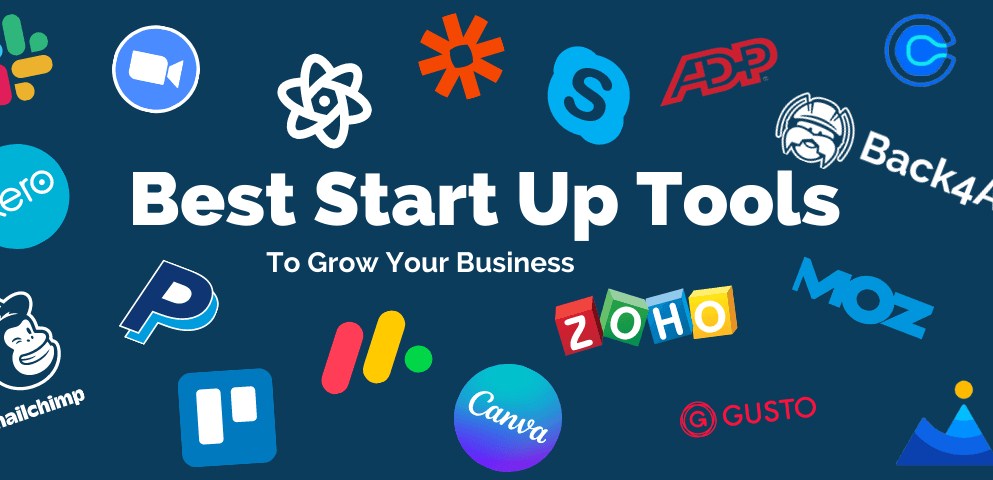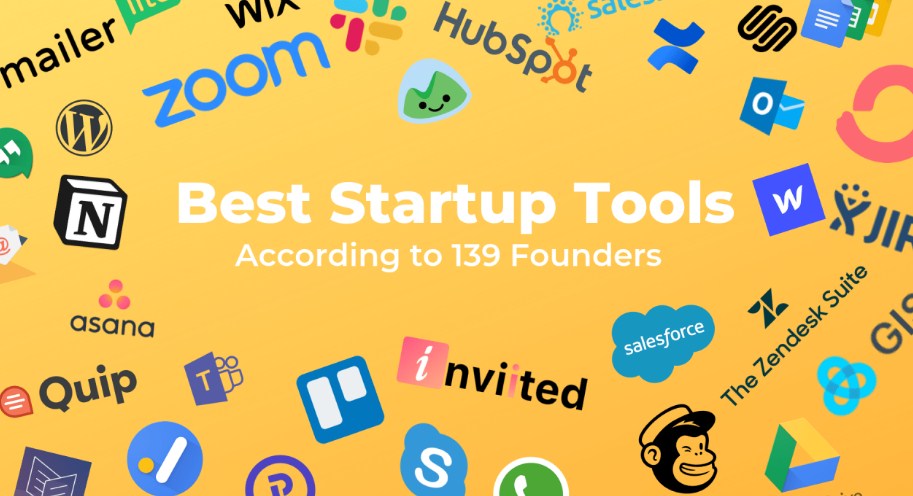Best Software for Startups – Starting a new business is a thrilling yet challenging journey. As a startup founder, one of the most important things you’ll need is the right software to streamline operations, improve productivity, and help you scale quickly. But with so many options available, choosing the best software for startups can be overwhelming. Don’t worry—we’ve got you covered!

In this guide, we’ll walk you through the best software for startups, detailing their features, benefits, pricing, and where to buy them. These tools have been handpicked for their ability to solve common startup problems and propel your business forward.
Why You Need the Best Software for Startups
The startup world is fast-paced, and you need tools that can help you keep up. Good software not only saves time but also enhances collaboration, automates mundane tasks, and helps you make informed decisions. From project management to accounting, marketing, and customer support, the right tools can significantly impact your business’s success.
Key benefits of using the best software for startups include:
- Increased Efficiency: Automate repetitive tasks, freeing up your team’s time for more strategic work.
- Better Collaboration: Foster seamless communication across teams and departments.
- Scalability: Many software solutions are designed to grow with your business.
- Cost-Effectiveness: Get more done without needing to hire additional staff.
- Data-Driven Insights: Make better decisions with real-time data analytics.
Top 5 Best Software for Startups in 2025
We’ve carefully selected five of the best tools for startups that cover essential business needs. Let’s dive into the details:
1. Trello – Project Management Made Simple
Product Overview:
Trello is a popular, intuitive project management tool designed to help startups stay organized. It allows teams to collaborate, track progress, and manage projects with ease.
Key Features:
- Drag-and-drop interface for task management.
- Customizable workflows and task boards.
- Integration with Google Drive, Slack, and more.
- Real-time updates and notifications.
Pros:
- Easy to use, even for beginners.
- Affordable pricing for startups.
- Customizable boards for various use cases.
- Seamless integration with other tools.
Cons:
- Lacks advanced project reporting features.
- Limited to task management, not full project tracking.
Pricing:
- Free Plan: Basic features for small teams.
- Business Class: $10/user/month – Additional features like more integrations, unlimited automation.
- Enterprise: Custom pricing – Advanced security features and unlimited workspaces.
Best For:
Trello is ideal for startups that need a simple, intuitive project management tool to organize tasks and collaborate with their team.
2. QuickBooks – Accounting Software for Startups
Product Overview:
QuickBooks is a leading accounting software that helps startups track income and expenses, create invoices, and run payroll. It’s perfect for businesses that want to stay on top of their finances without the need for an in-house accountant.
Key Features:
- Automated invoicing and billing.
- Payroll management and tax calculation.
- Real-time profit and loss tracking.
- Expense categorization and tax reporting.
Pros:
- User-friendly interface for non-accountants.
- Great reporting tools.
- Scalable for growing businesses.
- Cloud-based, so accessible from anywhere.
Cons:
- Can be expensive for smaller startups.
- Limited customization for reports.
Pricing:
- Self-Employed: $15/month – For freelancers or solo entrepreneurs.
- Simple Start: $25/month – Basic accounting features.
- Essentials: $50/month – For businesses with multiple users.
- Plus: $80/month – Advanced features, including inventory tracking and project management.
Best For:
Startups in need of a reliable accounting software that makes managing finances straightforward and saves time on administrative tasks.
3. HubSpot – Marketing and CRM for Startups
Product Overview:
HubSpot offers a powerful CRM platform with built-in marketing, sales, and customer service tools. It’s one of the best all-in-one software solutions for startups looking to scale their customer outreach and sales.
Key Features:
- Free CRM that grows with your business.
- Marketing automation and email campaigns.
- Lead capture and conversion tools.
- Detailed analytics and reporting dashboards.
Pros:
- Free plan with essential features.
- Easy to use and beginner-friendly.
- Comprehensive tools for sales and marketing.
- Extensive integration with other apps.
Cons:
- Advanced features are expensive.
- Some tools require a learning curve.
Pricing:
- Free Plan: Includes basic CRM features, email tracking, and forms.
- Starter: $50/month – For marketing and sales automation.
- Professional: $500/month – For advanced CRM and marketing tools.
- Enterprise: $1,200/month – Includes custom solutions for large teams.
Best For:
Startups looking to build and manage their customer relationships while automating marketing tasks for better engagement and lead generation.
4. Slack – Team Communication & Collaboration
Product Overview:
Slack is a messaging platform designed to facilitate real-time communication and collaboration among teams. It replaces email and helps startups communicate efficiently with channels, direct messages, and more.
Key Features:
- Channels for organizing conversations by topic.
- Direct messaging and file sharing.
- Integration with tools like Google Drive and Zoom.
- Powerful search functionality.
Pros:
- Simple, easy-to-navigate interface.
- Customizable notifications to stay on top of priorities.
- Integration with hundreds of other apps.
- Excellent mobile app for on-the-go collaboration.
Cons:
- Can get noisy with lots of messages.
- The free plan has limited message history.
Pricing:
- Free Plan: Limited to 10,000 messages.
- Standard: $6.67/user/month – Full message history and integrations.
- Plus: $12.50/user/month – Advanced features for larger teams.
Best For:
Startups that prioritize communication and collaboration, especially remote teams, or those working on multiple projects at once.
5. Zapier – Workflow Automation
Product Overview:
Zapier helps startups automate workflows by connecting their favorite apps and creating “Zaps” that automatically move data between them. It’s a game-changer for saving time and reducing manual tasks.
Key Features:
- Connects over 3,000 apps like Gmail, Slack, Trello, and QuickBooks.
- Easy-to-use interface for setting up workflows.
- Automate routine tasks like data entry, lead capturing, and notifications.
- Real-time error notifications.
Pros:
- Automates repetitive tasks to boost productivity.
- Supports thousands of integrations.
- Extremely flexible with custom workflow design.
- Saves time for startups by reducing manual effort.
Cons:
- Pricing can get expensive with higher volume usage.
- Some integrations may require a learning curve.
Pricing:
- Free Plan: 100 tasks per month, limited features.
- Starter: $19.99/month – 750 tasks, more integrations.
- Professional: $49/month – Advanced features, 2,000 tasks/month.
- Team: $299/month – Collaboration features for teams with 50,000 tasks/month.
Best For:
Startups looking to automate repetitive tasks and integrate multiple apps to streamline business operations.

Comparison Table: Best Software for Startups
| Product | Use Case | Features | Price | Pros | Cons |
|---|---|---|---|---|---|
| Trello | Project Management | Task boards, drag-and-drop, integrations | Free, $10-$17/month | Simple, customizable, affordable | Limited advanced features |
| QuickBooks | Accounting | Invoicing, payroll, tax reports | $15-$80/month | Great for managing finances, cloud-based | Expensive for small startups |
| HubSpot | CRM & Marketing | Marketing automation, email campaigns | Free, $50-$1,200/month | All-in-one CRM, scalable | Advanced features expensive |
| Slack | Team Communication & Collaboration | Channels, file sharing, integrations | Free, $6.67-$12.50/month | Easy-to-use, integrates with many apps | Free plan limits message history |
| Zapier | Workflow Automation | App integration, automate tasks | Free, $19.99-$299/month | Saves time, flexible automation | Higher volume usage can be costly |
How to Buy and Where to Buy These Tools
Each of the tools above can be purchased directly from the respective websites. Simply click on the links to access the product pages and get started with your purchase.
- Trello: Free plan available; upgrade for additional features.
- QuickBooks: Choose from various pricing plans based on your business needs.
- HubSpot: Start with a free plan and upgrade as your business grows.
- Slack: Get started with the free plan, or upgrade to unlock premium features.
- Zapier: Start automating with the free plan, or scale up for advanced functionality.
FAQs
1. What is the best software for startups?
The best software for startups depends on your specific needs, such as project management, accounting, CRM, or automation. Tools like Trello, QuickBooks, HubSpot, Slack, and Zapier are top choices.
2. Are there free software options for startups?
Yes! Many tools like Trello, HubSpot, and Slack offer free plans with basic features that are perfect for startups on a budget.
3. How can these tools help my startup grow?
These tools streamline operations, improve team communication, automate tasks, and provide valuable insights, helping you focus on growing your business rather than getting bogged down in administrative work.
4. What is the cost of these tools for startups?
Costs vary depending on the software. Plans range from free to several hundred dollars per month, depending on the features you need. Always start with the free plan to test the software before committing to a paid version.
5. How do I integrate these tools with my existing systems?
Most of these tools offer integrations with other popular software, making it easy to connect them with your existing systems like email, file storage, and customer relationship management systems.
This detailed guide has provided you with valuable insights into the best software for startups, their features, pricing, and how they can benefit your business. By choosing the right tools, you can streamline your operations, improve productivity, and set your startup up for success in 2025 and beyond!
Read More >>>
- Best HubSpot CRM Software for 2025: Benefits, Use Cases, Pricing & More
- Apptivo CRM: Complete Guide to Features, Benefits & Where to Buy in 2025